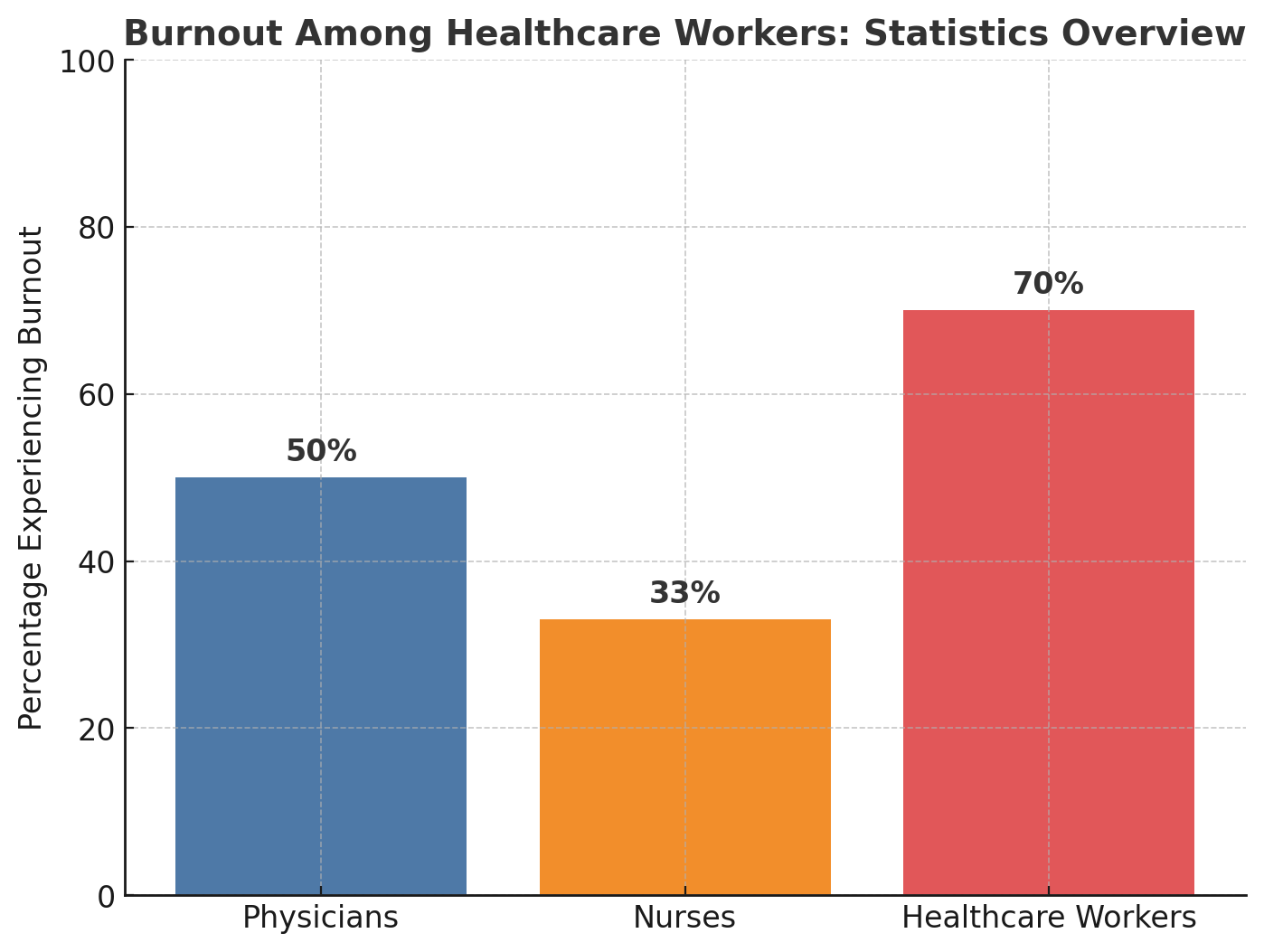The bravest are surely those who have the clearest vision of what is before them—danger, and yet they go out to meet it.
Healthcare workers are the cornerstone of the medical system. They are on the frontlines, delivering care when we are most vulnerable. From doctors and nurses to allied health professionals, they work tirelessly to ensure the well-being of patients. However, the very individuals we rely on for our health are facing an alarming crisis of burnout. Despite the widespread recognition of this issue, the common solution remains self-care: take a yoga class, meditate, or enjoy a bubble bath. But is self-care really enough to address the deep-rooted factors driving healthcare worker burnout?
Burnout among healthcare workers is not just a buzzword. It’s a crisis with serious implications for the workforce and the healthcare system at large. The statistics are alarming:
In the face of burnout, self-care is often recommended as a quick fix. Practices like yoga, meditation, and mindfulness apps are suggested as ways to combat stress. While these methods can be beneficial in managing day-to-day stress, they fall short in addressing the root causes of burnout among healthcare workers.
For healthcare workers, the demands of the job go beyond what any wellness routine can fix. A typical day involves long shifts, understaffed teams, difficult patients, and exposure to trauma. Yoga might reduce temporary stress, but it doesn't solve the systemic issues that lead to burnout. When healthcare workers are stretched thin, no amount of self-care can make up for insufficient staffing, unmanageable workloads, or lack of support from leadership.
Moreover, many healthcare workers feel that self-care is a luxury they simply cannot afford. The expectation that they should 'just practice self-care' ignores the practical reality of their work environment. When your day is filled with back-to-back patients, administrative tasks, and the constant pressure of life-and-death decisions, carving out time for yoga or meditation feels impossible.
To tackle burnout effectively, we must shift the focus from individual self-care to organizational and systemic changes. Addressing burnout requires a multifaceted approach that takes into account the root causes of the problem. Here are some strategies that can make a meaningful difference:
One of the primary drivers of burnout is excessive workload. Healthcare workers are often asked to do more than is humanly possible, leading to exhaustion, frustration, and a sense of helplessness. Some ways to manage workloads more effectively include:
Adequate Staffing: Ensuring that healthcare facilities maintain appropriate patient-to-staff ratios is crucial. Overburdening healthcare workers not only increases the risk of burnout but also compromises patient care.
Balanced Schedules: Shifting away from excessive overtime and offering more predictable schedules can give healthcare workers the rest they need to recharge.
Fair Compensation: The physical and emotional demands placed on healthcare workers should be matched by fair compensation. This includes not only salary but also benefits such as mental health support and paid time off.
Healthcare work often involves dealing with traumatic and high-stress situations, which can take a serious toll on mental health. To help workers cope with the emotional strain of the job, healthcare organizations should consider:
Access to Counseling: Offering confidential counseling services can provide healthcare workers with the support they need to process trauma and manage stress.
Encouraging Mental Health Conversations: It's important to normalize discussions about mental health in the workplace. Encouraging open dialogue can help reduce stigma and promote better self-care.
Peer Support Programs: Creating peer support networks where healthcare workers can connect with each other, share experiences, and offer mutual support can help reduce feelings of isolation.
A positive work environment plays a pivotal role in mitigating burnout. When healthcare workers feel respected, valued, and supported, they are more likely to feel engaged and satisfied with their work. Some ways to promote a supportive work culture include:
Recognition and Respect: Regularly recognizing the hard work and dedication of healthcare staff can go a long way in boosting morale. Simple gestures of appreciation can help workers feel valued.
Effective Communication: Open lines of communication between staff and leadership foster trust and collaboration. When workers feel heard and understood, it can reduce feelings of frustration and burnout.
Opportunities for Growth: Providing healthcare workers with opportunities for career development, training, and advancement helps them feel invested in their roles and reduces the risk of burnout.
Healthcare workers play an essential role in society, and the need to support them is more urgent than ever. Burnout not only affects the well-being of healthcare workers but also has significant consequences for patient care and the healthcare system as a whole. While self-care is a valuable tool, it is not enough to address the complex and systemic issues driving burnout. We need to take a holistic approach, one that includes better workload management, emotional support, and a positive work environment.
Healthcare organizations must take responsibility for creating supportive workplaces that prioritize the health and well-being of their staff. This is not just a matter of improving job satisfactions, but about ensuring the long-term sustainability of the healthcare workforce and, ultimately, the quality-of-care patients receive.
Share your thoughts in the comments. Let’s open the conversation and start making meaningful changes today.
1. Burnout Among Healthcare Workers: Statistics Overview
A chart illustrates the percentage of physicians, nurses, and other healthcare workers who report burnout experiencing.

1. Shanafelt, T. D., Boone, S., Tan, L., et al. (2012). Burnout and satisfaction with work-life balance among US physicians relative to the general US population. *Archives of Internal Medicine, 172*(18), 1377-1385. [DOI](https://doi.org/10.1001/archinternmed.2012.3199)
2. Berg, D. (2020). Nurses’ Mental Health and the Impact on Retention and Work Performance. *The Journal of Nursing Administration, 50*(10), 532-538. [DOI](https://doi.org/10.1097/NNA.0000000000000907)
3. Dyrbye, L. N., Shanafelt, T. D., Sinsky, C. A., et al. (2020). Burnout and the Effects of Psychosocial Stress on Healthcare Providers. *The Lancet Psychiatry, 7*(4), 333-340. [DOI](https://doi.org/10.1016/S2215-0366(19)30558-4)